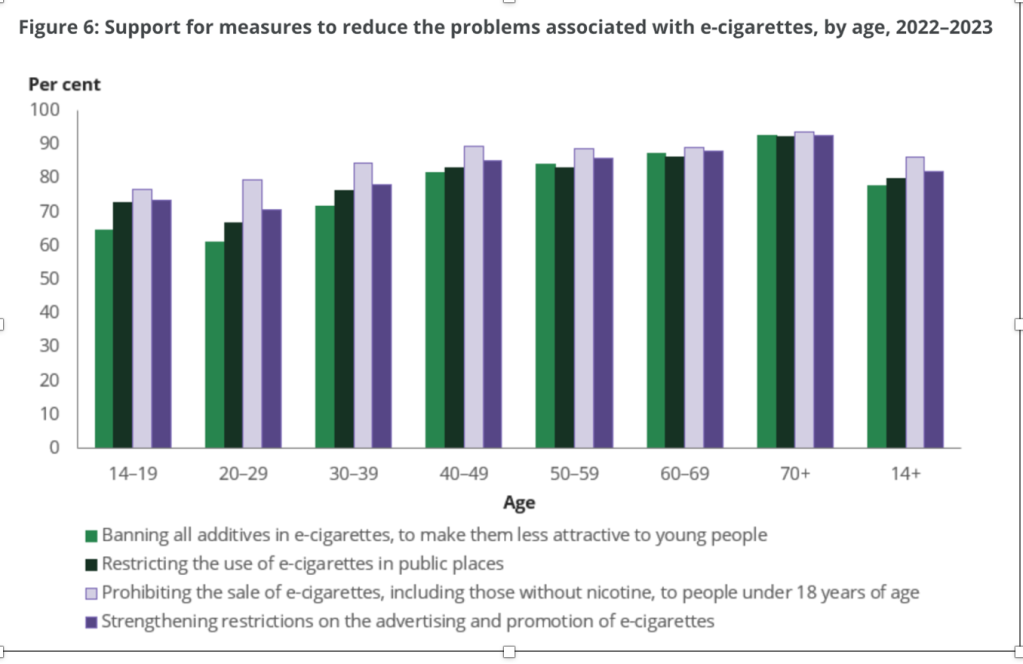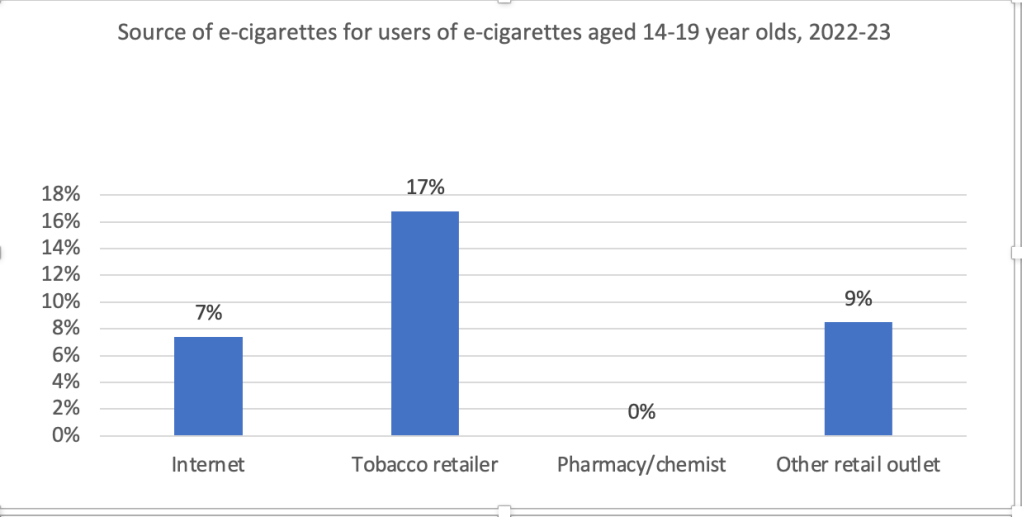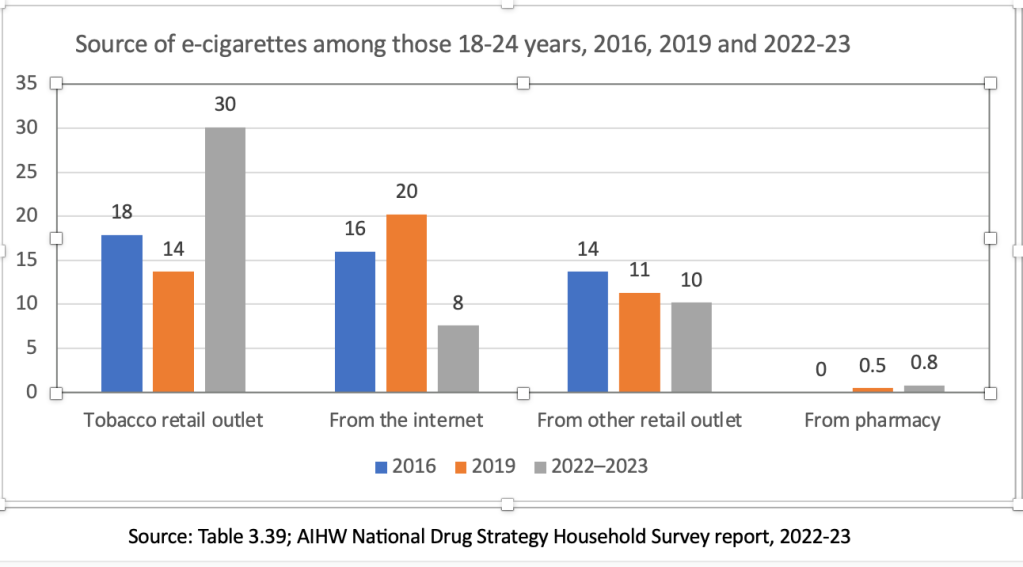[updated 18 Apr 2024]
The latest official national data on smoking and vaping in Australia were released in late February. One of the most remarkable sets of findings was the massive support across the community for tough controls on the promotion and supply of vapes (see chart below).

The data were collected between 2022 and May 2023 from some 21,500 people across Australia by the Roy Morgan company, on contract from the Australian Institute of Health and Welfare to conduct the latest in the National Drug Household Survey (NDHS) series, run since 1985.
A question about restricting sales of vapes to those with a prescription was not included. But former health minister in the Morrison government Greg Hunt had announced his support for the TGA recommendation in December 2020. This received widespread news coverage in the three years since, including during the survey period.
Here’s how much the Australian public supports four proposals to reduce youth vaping.
- Banning all additives in e‑cigarettes, to make them less attractive to young people: 78%, (question asked for the first time in the 2022–2023 survey)
- Restricting the use of e‑cigarettes in public places: 80% – an increase from 69% in 2019.
- Prohibiting the sale of e‑cigarettes, including those without nicotine, to people under 18 years of age: 86%, an increase from 79% in 2019.
- Strengthening restrictions on the advertising and promotion of e‑cigarettes: 82%, an increase from 67% in 2019.
I’ve tried, but I cannot find any contemporary social issue where there is anything surpassing the overwhelming support for vaping controls shown in the chart above. For example, the 2017 national plebiscite on marriage equality saw 61.7% vote yes. Two thirds of Australians want the government to do more on climate change. In 2022, two in three believed junk food advertising in children’s viewing times should be banned and 70% believe that gambling ads on TV should be banned. But support for tough restrictions on promotion and sale of vaping products is running between 78% and 86%.
But then we have this …
A letter signed by “31 Australian tobacco control and addiction experts” sent to federal politicians on 18 March 2024 stated that “A recent Redbridge Survey found that 84% of adults agree/strongly agree that ‘Nicotine vaping products should only be available through licensed retail outlets to adults’”.
The report of the survey is here. It was commissioned by the Australian Association of Convenience Stores (AACS) whose CEO is a former long-time employee of British American Tobacco. It focuses on industry-supported positions about how vaping products would best be regulated in Australia and shows the data by the 2022 voting choices of those completing the survey. So with this complexion, it was clearly intended by those who commissioned it as an exercise in warning politicians about the possible political repercussions of the government’s legislation being adopted.
So let’s take a walk through it.
First, who is the Redbridge consulting company which is responsible for the survey? Its website states its mission is “helping clients manage political risks through research-led communication and advocacy” and that “We enable clients to influence governments, stakeholders and public opinion to achieve outcomes that provide shared and meaningful benefits.” Redbridge’s pitch to potential clients is nakedly about influencing opinion and policy rather than simply measuring knowledge, attitudes and behaviour in the way that any survey with no agenda would have done.
Redbridge’s mission is to deliver its clients potent data consistent with its clients’ policy objectives that might help foment the clients’ desired outcomes being achieved.
So who then, was the commissioning client for survey? Significantly, the report says nothing about this, a standard inclusion in survey reporting. So we are left to speculate about who forked out for the survey, which would not have been cheap.
Along with the big three tobacco companies in Australia (PMI, BAT and Imperial Brands) which have all declared their opposition to prescription access to vapes) the AACS is a sworn enemy of prescription access. The AACS of course exists to serve the interests of its members in the convenience store channel, most of which sell tobacco. The AACS has a long history of tobacco industry support, with tobacco companies paying premium top-tier membership fees. All tobacco companies are heavily invested in vapes.
The AACS recently declined to declare to a Senate committee the amount of the support it receives from the tobacco and vaping industries, with Senator Marielle Smith who is chairing the current Senate committee on vaping telling its CEO to provide that information as soon as possible.
Convenience stores have been one source of supply of vapes in Australia with approximately 8.5% of consumers reporting that they’d purchased nicotine vaping products from convenience stores despite it being illegal to sell vaping products containing nicotine outside the prescription arrangements. They desperately want that river of gold to keep flowing into their shops. Effective enforcement of Australia’s longstanding laws on prescription medicines will end their ability to sell vapes openly, and the large penalties for selling proposed amendments currently under consideration by the Parliament are likely to deter the great majority of retailers from doing so.
The report does not show the actual questionnaire
While the Redbridge report takes us through responses to questions asked in the survey, it provides no copy of the exact questionnaire used, showing the order of the questions. In surveys, ordering can be critical in framing and conditioning respondents’ understanding of and responses to subsequent questions. Critically here, the industry-supported position that vapes ‘should be regulated like alcohol and tobacco’ was asked without any alternative policies being presented or contextualised. Without such alternatives, many respondents who are likely to have no detailed understanding of the alternatives and their rationale, would have their response options powerfully framed by this comparison with alcohol and tobacco regulation.
The prescription regulatory model used for restricting access to addictive drugs like codeine, methadone and pseudoephedrine (and indeed to all prescribed drugs) is the clear and obvious alternative here. There are very few cases of retailers selling of prescription drugs by those not authorised to do so (registered pharmacists).
If as seems likely, this question appeared early in the questionnaire, this placement would make it highly likely that many would agree with that proposition in the absence of any alternative options. As we saw in the NDHS survey, almost all Australians want more effective action to stop illegal vape sales. So having agreed that the regulatory models used for alcohol and tobacco were the way to go at the beginning of the survey, many respondents would want their subsequent responses to be consistent with what they had responded earlier, biasing their consideration through to the end of the survey.
Who were the sample of people who completed the questionnaire?
The report simply states that the respondents were “recruited over online panel” using quotas forage, gender, location, education and vote at the 2022 federal election. So we know nothing from the report about how the online panel came to be assembled. How were they recruited? What were the refusal rates to join the panel and to engage with this survey on vaping? How was the survey’s scope and purpose described to them? Were they told who had commissioned the survey? If not, why not? Were they paid? The absence of this basic information is concerning.
Question asked: Do you agree or disagree with the following statement? Regulated nicotine vaping products should only be available for sale to persons aged 18 and above through licensed retail outlets, the same as alcohol and tobacco products.
The tobacco and convenience store lobbies want prescription access scrapped and instead the licensing of vape retailers. It is doubtful that many respondents would be aware that tobacco retailers are already licensed/registered in six Australian jurisdictions or that it has always been illegal to sell nicotine vapes to anyone and to sell non-nicotine vapes to those under 18 years. Such sales are enormous despite this illegality.
Between 2019 and 2023, the proportion of young people buying e-cigarettes directly from tobacco retailers went up—from 7.1% to 16.8% of 14–19 year-old users and from 12.5% to 26.1% in 15–24 year old users The proportion of 18-24 years old users who reported purchasing from a tobacco retail outlet increased from 13.7% to 30.1% (Table 3.39). Among those 18-24, fewer than 10% of young reported using vapes sold as not containing nicotine (Table 3.18), so the vast majority of sales to young people in all these groups would have been illegal either because they were under 18 and/or because the vapes contained nicotine. [Tables here].
An informative preamble to the question should have been worded like this:
“Tobacco retailers are licensed or registered in six Australian states and territories. It is already illegal to sell nicotine vapes to anyone without a prescription, yet the latest data show that tobacco retailers are major sources of purchasing vapes despite this illegality. Given this, doyou agree or disagree with the following statement? Regulated nicotine vaping products should only be available for sale to persons aged 18 and above through licensed retail outlets, the same as alcohol and tobacco products.”
This would have provided respondents with highly relevant information critical to answering the question.
How many respondents may have supported the general sales model and how many the pharmaceutical supply model as their preferred option had they been presented with the following data?


Use of highly biased information in preamble
In the preamble to the question about the preferred model,a statistic is used that would clearly bias respondents against the plan that the Government should tighten laws to ensure that the prescription-access model actually works. It states that despite restrictions, the “National Illicit Drug Reporting System survey has found only 3% of vapers have a nicotine prescription, with 97% of nicotine vapers purchasing illegally.”
Few if any respondents would have any knowledge about what the NIDRS study is. It is not a population representative survey. It is a study tracking behaviour among a group of regular illicit drug users, not the whole population. So it is a group of people quite different to the population as a whole. Use of prescriptions is much higher among the general public, as shown in a 2022 survey of adults in Victoria, and the 2022-23 NDHS.
This information would suggest that nearly all vapers are choosing to not buy their vapes via prescription. This would hardly be surprising, given that none of the Government’s new enforcement measures came into place until 2024, whereas the Redbridge survey was conducted in February 2024. Vapes remain readily available today, with no penalty to either users or retailers (the latter being simply due to lack of enforcement).
But in any case, it is hardly surprising that high numbers of people reported purchasing from tobacco and other retailers selling illegally. None of the Government’s new enforcement measures relating to local sale or supply will come into force until later in 2024, whereas this survey was conducted in February 2024. Vapes remain readily available today, with no penalty to either users or retailers (the latter being simply due to current lack of feasible enforcement).
In summary, the Redbridge survey ticks many boxes as a deliberate effort to secure data that serve the commissioning sponsors’ commercial agenda of discrediting the prescription access model and showing that Australians think regulating access to vapes should learn nothing from the catastrophic errors across 120 years of allowing tobacco to be sold literally everywhere.
This has been achieved by biased and incomplete preambles to questions that do not allow respondents relevant information and which would likely deflate their glib assumption that teenage vaping is a problem that can be sold by handing the official keys to “regulated” vaping to the very retail sectors which have knowing and brazenly broken the law for years.
How many of the 31 signatories actually read the survey?
The list of 31 “expert” addiction and tobacco control signatories to the letter to politicians contains many names who have no or next to no track record in population-focussed tobacco control. Across my 40+ years in tobacco control I have never seen most of them in any meeting, conference, forum or committee concerned with any aspect of tobacco control. And across 17 years of editing the BMJ’s Tobacco Control , I saw very few of them ever submit a single paper to the journal.
Their views on vaping control are as relevant as mine would be on a political letter about (say) the best way to reform pill testing at music festivals.
The dominant group among the signatories are those with illicit drug professional backgrounds who appear to have little understanding of the detail of tobacco control policy, its history and achievements, and the short and long game strategies of those highly motivated to jeopardise those achievements.
But their signatures on the political letter also suggest many of them did not even look at the survey their names blessed by their gesture. They should be embarrassed.
The NHHS data above suggest that any major political party failing to acknowledge this unprecedented support will alienate a large proportion of the community if it seeks to respond to the vaping epidemic with self-serving options being cheered on by the vaping, tobacco and convenience store industries.
Other blogs in this series
Vaping theology: 1 The Cancer Council Australia takes huge donations from cigarette retailers. WordPress 30 Jul, 2020
Vaping theology: 2 Tobacco control advocates help Big Tobacco. WordPress 12 Aug, 2020
Vaping theology: 3 Australia’s prescribed vaping model “privileges” Big Tobacco WordPress Feb 15, 2020
Vaping theology: 4 Many in tobacco control do not support open access to vapes because they are just protecting their jobs. WordPress 27 Feb 2021
Vaping theology: 5 I take money from China and Bloomberg to conduct bogus studies. WordPress 6 Mar, 2021
Vaping theology: 6 There’s nicotine in potatoes and tomatoes so should we restrict or ban them too? WordPress 9 Mar, 2021
Vaping theology: 7 Vaping prohibitionists have been punished, hurt, suffered and damaged by Big Tobacco WordPress 2 Jun, 2021
Vaping theology: 8 I hide behind troll account. WordPress 29 Jun, 2021
Vaping theology: 9 “Won’t somebody please think of the children”. WordPress 6 Sep, 2021
Vaping theology: 10: Almost all young people who vape regularly are already smokers before they tried vaping. WordPress 10 Sep, 2021
Vaping theology: 11 The sky is about to fall in as nicotine vaping starts to require a prescription in Australia. WordPress 28 Sep, 2021
Vaping theology: 12 Nicotine is not very addictive WordPress 3 Jan 2022
Vaping theology 13: Kids who try vaping and then start smoking,would have started smoking regardless. WordPress 20 Jan, 2023
Vaping theology 14: Policies that strictly regulate vaping will drive huge
numbers of vapers back to smoking, causing many deaths. WordPress 13 Feb, 2023
Vaping theology 15: The government’s prescription vape access scheme has failed, so let’s regulate and reward illegal sellers for what they’ve been doing. WordPress 27 Mar 2023
Vaping theology 16: “Humans are not rats, so everybody calm down about nicotine being harmful to teenage brains”. WordPress 13 Jul, 2023
Vaping theology 17: “Vaping advocates need to be civil, polite and respectful” … oh wait. WordPress 3 Oct, 2023
Vaping theology 18: Vaping is a fatally disruptive “Kodak moment” for smoking. WordPress Oct 30, 2023
Vaping theology 19: Vaping explosions are rare and those who mention them are hypocrites. WordPress 17 Nov, 2023
Vaping theology 20 : Today’s smokers are hard core nicotine dependent who’ve tried everything and failed – so they need vapes. WordPress 14 Dec, 2023
Vaping theology 21: Australia’s prescription vapes policy failed and saw rises in underage vaping and smoking. WordPress 10 Jan, 2024
Vaping theology 22: “Prohibition has never worked at any point for any other illicit substance”. WordPress 17 Mar 2024
Vaping theology 23: “84% of the Australian public are opposed to the way the government will regulate vapes” WordPress 2 Apr, 2024
